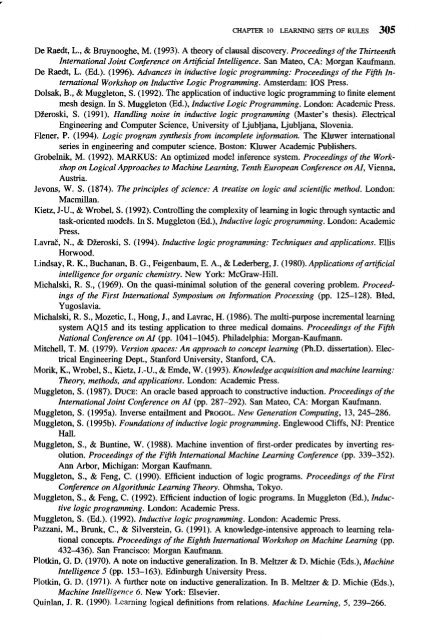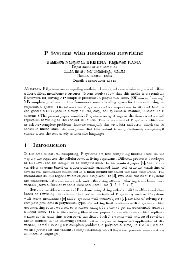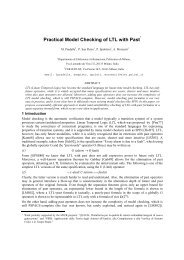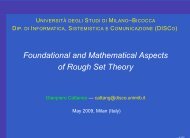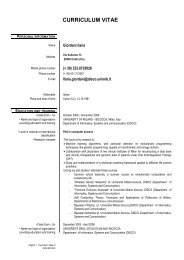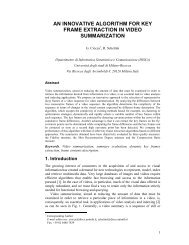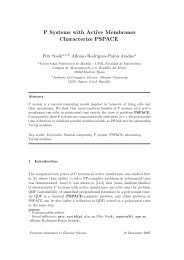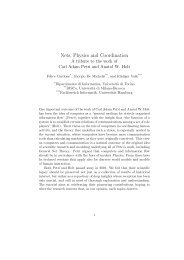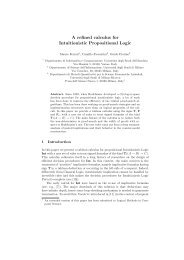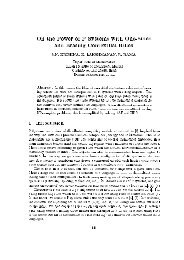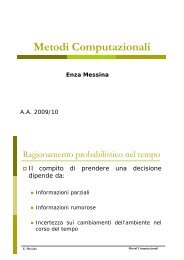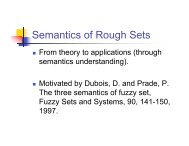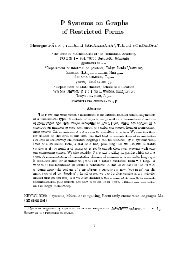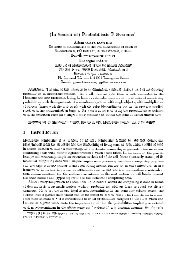Machine Learning - DISCo
Machine Learning - DISCo
Machine Learning - DISCo
Create successful ePaper yourself
Turn your PDF publications into a flip-book with our unique Google optimized e-Paper software.
De Raedt, L., & Bruynooghe, M. (1993). A theory of clausal discovery. Proceedings of the Thirteenth<br />
International Joint Conference on ArtGcial Intelligence. San Mateo, CA: Morgan Kaufmann.<br />
De Raedt, L. (Ed.). (1996). Advancm in inductive logic programming: Proceedings of the Fifh International<br />
Workshop on Inductive Logic Programming. Amsterdam: IOS Press.<br />
Dolsak, B., & Muggleton, S. (1992). The application of inductive logic programming to finite element<br />
mesh design. In S. Muggleton (Ed.), Inductive Logic Programming. London: Academic Press.<br />
DZeroski, S. (1991). Handling noise in inductive logic programming (Master's thesis). Electrical<br />
Engineering and Computer Science, University of Ljubljana, Ljubljana, Slovenia.<br />
Flener, P. (1994). Logic program synthesis from incomplete information. The Kluwer international<br />
series in engineering and computer science. Boston: Kluwer Academic Publishers.<br />
Grobelnik, M. (1992). MARKUS: An optimized model inference system. Proceedings of the Workshop<br />
on Logical Approaches to <strong>Machine</strong> <strong>Learning</strong>, Tenth European Conference on AI, Vienna,<br />
Austria.<br />
Jevons, W. S. (1874). The principles of science: A treatise on logic and scientijc method. London:<br />
Macmillan.<br />
Kietz, J-U., & Wrobel, S. (1992). Controlling the complexity of learning in logic through syntactic and<br />
task-oriented models. In S. Muggleton (Ed.), Inductive logic programming. London: Academic<br />
Press.<br />
LavraE, N., & Dieroski, S. (1994). Inductive logicprogramming: Techniques and applications. Ellis<br />
Horwood.<br />
Lindsay, R. K., Buchanan, B. G., Feigenbaurn, E. A., & Lederberg, J. (1980). Applications of art@cial<br />
intelligence for organic chemistry. New York: McGraw-Hill.<br />
Michalski, R. S., (1969). On the quasi-minimal solution of the general covering problem. Proceedings<br />
of the First International Symposium on Information Processing (pp. 125-128). Bled,<br />
Yugoslavia.<br />
Michalski, R. S., Mozetic, I., Hong, J., and Lavrac, H. (1986). The multi-purpose incremental learning<br />
system AQ15 and its testing application to three medical domains. Proceedings of the Fifh<br />
National Conference on A1 (pp. 1041-1045). Philadelphia: Morgan-Kaufmann.<br />
Mitchell, T. M. (1979). Version spaces: An approach to concept learning (Ph.D. dissertation). Electrical<br />
Engineering Dept., Stanford University, Stanford, CA.<br />
Morik, K., Wrobel, S., Kietz, J.-U., & Emde, W. (1993). Knowledge acquisition and machine learning:<br />
Theory, methods, and applications. London: Academic Press.<br />
Muggleton, S. (1987). DUCE: An oracle based approach to constructive induction. Proceedings of the<br />
International Joint Conference on AI @p. 287-292). San Mateo, CA: Morgan Kaufmann.<br />
Muggleton, S. (1995a). Inverse entailment and PROGOL. New Generation Computing, 13, 245-286.<br />
Muggleton, S. (1995b). Foundations of inductive logic programming. Englewood Cliffs, NJ: Prentice<br />
Hall.<br />
Muggleton, S., & Buntine, W. (1988). <strong>Machine</strong> invention of first-order predicates by inverting resolution.<br />
Proceedings of the Fzfth International <strong>Machine</strong> <strong>Learning</strong> Conference (pp. 339-352).<br />
Ann Arbor, Michigan: Morgan Kaufmann.<br />
Muggleton, S., & Feng, C. (1990). Efficient induction of logic programs. Proceedings of the First<br />
Conference on Algorithmic <strong>Learning</strong> Theory. Ohrnsha, Tokyo.<br />
Muggleton, S., & Feng, C. (1992). Efficient induction of logic programs. In Muggleton (Ed.), Inductive<br />
logic programming. London: Academic Press.<br />
Muggleton, S. (Ed.). (1992). Inductive logic programming. London: Academic Press.<br />
Pazzani, M., Brunk, C., & Silverstein, G. (1991). A knowledge-intensive approach to learning relational<br />
concepts. Proceedings of the Eighth International Workshop on <strong>Machine</strong> <strong>Learning</strong> (pp.<br />
432-436). San Francisco: Morgan Kaufmann.<br />
Plotkin, G. D. (1970). A note on inductive generalization. In B. Meltzer & D. Michie (Eds.), <strong>Machine</strong><br />
Intelligence 5 (pp. 153-163). Edinburgh University Press.<br />
Plotkin, G. D. (1971). A further note on inductive generalization. In B. Meltzer & D. Michie (Eds.),<br />
<strong>Machine</strong> Intelligence 6. New York: Elsevier.<br />
Quinlan, J. R. (1990). <strong>Learning</strong> logical definitions from relations. <strong>Machine</strong> <strong>Learning</strong>, 5, 239-266.


